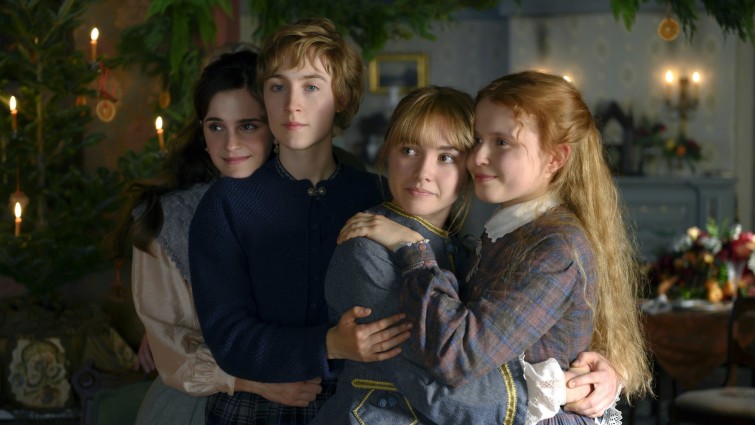

Member review

Little Women
Adapted from the much-loved novel, four sisters grow up together in the aftermath of the American Civil War.
Certificate
Duration135 mins
Review by
-
 Drishya, 16
Drishya, 16 - 6 reviews
The Brilliance of "Little Women"
Lively. Heartfelt. Heart-breaking. Greta Gerwig has done it again. What Lady Bird had, an irrefusable sensibility and dulcet authenticity (as well as a particular fixation on free-spirited women who challenge the status quo), Little Women has manifested and perfected again.
Safe to say it’s a worthy follow-up to Lady Bird.
For those (few) of you who have yet to have ever heard of Little Women, it’s a coming-of-age novel written by Louisa May Alcott, following the story of the four March sisters, Jo, Meg, Beth and Amy. The book has acted as a guiding hand throughout the lives of thousands of women. Undeniably, Alcott has played an immense role in shaping and morphing the spirits of generations of young girls.
So, maybe you could understand why I felt twinges of worry before going into the cinema: what if this was one of those movies where you had to grow up with its story, in order to fully enjoy it? What if I didn’t enjoy it at all? Despite previous qualms, I’m happy to declare that Greta Gerwig has successfully ensured this film isn’t bogged down at all by the impact of the original book, so despite the novel never having had any profound effect on me in my adolescence, I thoroughly enjoyed this film.
Within the first act of Little Women, I could already identify why this simple tale of sisterhood had been in print since 1868 and readapted over three times. Spoiler alert. It’s because it’s a simple tale of sisterhood.
We as a society, are guilty of favouring epics to simple character studies. That isn’t intended to be a jab at the cinematic universes moulded by action and CGI (cough, Marvel and Star Wars, cough), but a sign of recognition that big, untiring stories of heroism tend to nowadays, overshadow the humbler narrative. It’s plausible that a shadow of this phenomenon was present even in the 1900s as Little Women, a story of unadulterated domestic experiences, catapulted into a stream of success upon publication, that’s lasted vicariously until even now.
Simply put: people do like stories about ordinary people with ordinary lives – it’s just, as brilliantly said in the movie, not depicted enough in art. Whilst equipped with a refreshing plot, Little Women finds its centrepiece being its bracing set of characters, specifically Jo March.
Portrayed by the brilliant Saoirse Ronan, Jo is a fireball. She headlines the entire film with an irresistible buoyancy, paired with a touching femininity and familiarity that calls the audience to see themselves somewhat reflected on the screen. Jo March is an important character; she represents to us, not only the ambition and fire all women possess, but also the vulnerability.
Alongside her is a star-studded cast including Lara Dern, Meryl Streep and Emma Watson, all of whom play their characters wonderfully, showing that in a film about family, it is a cast’s collective warmth that determines how well everything will mesh together. Florence Pugh is a dynamo as Amy March. After a magnetising performance in Midsommar, she proves to us again, as The Hollywood Reporter expresses it, why it is “The Season of Florence Pugh”. She nails the immature spirit of Amy in her adolescence, harnessing all Amy-esque nuances, authoring her into a more likeable character than I ever expected; it felt like Pugh may as well have been reaching out through the screen and physically turning my head to focus on her every movement. And of course, speaking of turning heads, Timothée Chalamet plays a delightful Laurie. Chalamet and Ronan, as we have observed previously in Lady Bird, share a fantastic chemistry that shone throughout Little Women – especially in that proposal scene.
Little Women hits almost all the right notes. This film is Greta Gerwig exhibiting her growing flair for encapsulating the life of an average Joe. What she accomplishes is no easy feat. Instead of blurring out the monochrome parts of life, Gerwig chooses to stop, zoom in and enhance the picture. We see this in Little Women, through the carefully decided jumps in time, to the clear colour contrasts.
Childhood is given a saccharine filter spilling with auburn and luminance, whilst adulthood is cut out clearly with crisp, cold shades, giving the viewer a rather rough wakeup call that this isn’t Neverland anymore. In fact, the world in which the March sisters live, is never Neverland to begin with, but their vivacity and warmth elevate it. Alexandre Desplat’s mellifluous score tags along on the journey, lending honeyed piano notes that aid the playfulness of adolescence and orchestral strings signalling melancholy.
But in the midst of this harmonious screenplay is a slightly offkey note – Jo and Laurie. In the trailer, we get generous glimpses into Jo and Laurie’s big argument. Without revealing certain spoilers, I’ll admit that I left the theatre feeling conflicted over the resolution to the relationship between the two. All I’ll say is, I feel that those two have some unfinished business, and me being quite a nosy person who also grew quite invested into their characters, I would have liked to see both of them gain some closure.
Nevertheless, Greta Gerwig has crafted a spectacular film and despite its name, Little Women is a great feat of cinema that will most certainly be remembered historically as a giant within the coming-of-age genre.